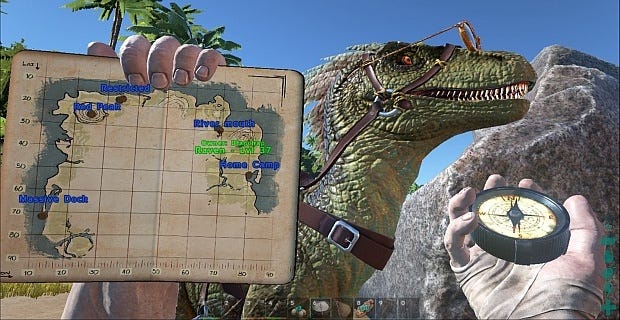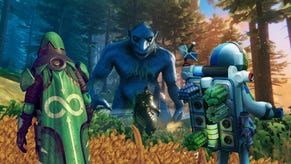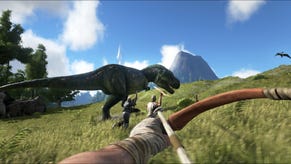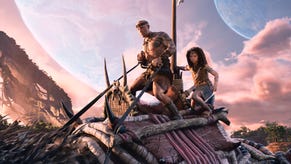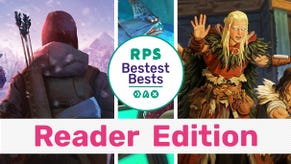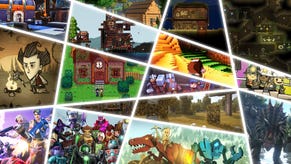The Future Plans & Popular Grind Of Ark: Survival Evolved
Who doesn't love grinding
Ark: Survival Evolved [official site] is currently the fifth most played game on Steam. It's not the first early access survival game to reach such heights, but so far it's one of the few to have maintained it. At this year's Gamescom 2015 I spoke to co-creative director Jesse Rapczak about what he feels Ark is doing different, their release and expansion plans, how you foster a less sociopathic survival game playerbase, and why his game is so grindy.
RPS: Why is Ark so far maintaining its popularity where other survival games have diminished?
Jesse Rapczak: I think that for us it's the frequency of our updates. We're always adding new content and the community always has new stuff to do.
We've also tried to open up our server hosting to be very flexible for people to play the game in different ways. So if some people don't like particular mechanics, like they think the taming mechanic takes too much of their time, they can find a server where it's greatly accelerated and they can play the game in a way that more fits their schedule.
Also trying really hard not to wipe their progress. We've never done a full server wipe at all, in the past two months. We've had a few game breaking issues where we had to wipe inventories or something like that but we've never gone in and wrecked people's progress building bases or their character progress or anything like that. So trying to be really sensitive to the time people have put in the game, almost treating it as a released game and not an early access game is maybe a little bit of the difference as to why people don't just up and quit the game after a server wipe and say, 'Ah, it's not worth it to work back up 30 hours to get where I was.'
RPS: You mention constantly updating it. Does that mean you plan to keep doing that even after you've launched from early access, or do you resign yourself to the player base diminishing after that point?
Rapczak: There's definitely a finish point. Our pace of updates will slow down a lot as we get towards release, as we don't want to be iterating on new stuff as we try to polish the game.
And we are also starting soon on our expansion content, which is lots of extra gameplay hours and story extensions on top of the main game. We're going to be developing that, starting soon, so that a few months after release we have a first expansion of Ark to go out and people have a big chunk of new content. We may iterate with that content in an early access-type way, with the community before we launch it. That's something that we talk about; having an early access for DLC rather than just the game, because we get so much out of that with the back and forth with the community.
But to answer your question, we'll see a slowdown. We have a target around the beginning of next year to start locking down and doing a formal alpha and beta period with the game, so that we can ship and really open up our options for release. We don't want it to be one day we release, and we just turn a switch and people are like, 'Wait a minute!' We want there to be a definite exit to early access and then release a very polished game.
RPS: If you're getting so much out of early access and you want to continue that for expansions and DLC, why come out of early access at all?
Rapczak: I think being an early access game forever would shut out a lot of the playerbase that don't want to play an early access game. It also sets a bar of quality for us, too, to get out of a state of iteration and into a state of polish and finishing.
It's important for us to get there because we want to set an example about how early access is a very important part of development these days. It shouldn't be the state of the game, permanently. It should be: work on the game get it to a point where it's ready for an early access phase; be early access for a set amount of time that you've planned for; and then polish up and finish the game after that.
I think the way that early access has kind of got a stigma with some games is because early access has no end and games stay there for multiple years. And some games are really good about it, but then some games sort of fall off the radar. It has this stigma of, 'maybe it finishes, maybe it doesn't,' and we don't want to be in that boat. We want everybody to know for sure that this will be a finished game at some point.
RPS: How do you manage the expectations of the audience? A lot of the time when v1.0 comes out for an early access game, any remaining bug is seen as a slap in the face of the people who are experiencing it and who supported the game during its development.
Rapczak: It's true. We see some of that even now with, 'I can't believe they're working on XBox when server performance is still bad.' To some degree it's a tough situation because, for everybody, the problems they are having with the game are the most important ones. If we can't address everybody's problems then people tend to get frustrated.
For us, we just try to remind people with our updates and by actually tackling bugs and getting bug reports from people, and doing things like offering bounties to people to tell us what the biggest and most game breaking bugs are. Just try to remind people that we're on top of it. It may not be coming right now, whatever you want the fix to be, but it's going to happen at some point. Our community... I don't know... I think it's important. We've recruited volunteer players from the community to help moderate. We have a full-time community manager also to help moderate, so I think some of those frustrations as well can be addressed just by listening to those people. We try to be very personable with the people who are frustrated, almost like customer service. 'Hey, we're listening, we may not be doing something about it right now, but we know it's a problem.'
So it's important to have people who are actually doing that for the fans. It's not worth our lead programmers time to actually go talk to them, because they've got other things to do, so by having other people be able to do that can help be the olive branch to the frustrated people.
RPS: To talk about the design of the game more: survival games can have a lot of grind in them, and in Ark you have to go punch those trees, collect berries, and though you can change it in server settings, it does take a long time to do a lot of things. Is there merit to grind? Is it a design decision you've made because you like grind, or is it something you feel is a necessary evil?
Rapczak: For the core survival mechanics, the way we originally designed the game, it was desirable to do that. In order to have some progression, we wanted to take the grind and let it be somewhat permanent with the character advancement, so that every time you die you're not redoing everything you've already done. It's stored in your character so your progress is visible to you and you feel like it was worth an hour of your time to grind on something because you unlocked this, you leveled up here.
But as we seen more players come into the game who have never played a survival game before, there's that playerbase that really doesn't like the grind. And even some of the people who are veteran survival players are like, 'It's really grindy right now.' A lot of the taming and stuff like that. So what we are trying to do to eliminate that is not take it away, but try to find ways in the game design to allow you to shorten some of those times.
Things we've been doing along those lines is giving special recipes that you can make, like kibble, to help train dinosaurs more quickly and to use certain food preferences to make taming go faster if you know the right recipes.
The thing with harvesting is that the dinosaurs are very important in the game, so it's somewhat intentional that it be very inefficient to harvest as a human, and the goal is to tame the right type of dinosaur to harvest more efficiently. We heard a lot from players to, like, 'In the game, I need a lot of fibre, and it's very inefficient for me to do it by hand.' So in that situation we're like, OK, let's make a new tool that you can craft that's three times as efficient for harvesting fibre, and that's our new sickle tool that we put in.
I think we're trying to solve [grind] by having in-game solutions to shorten the grindy stuff, so that once you've done it once you can go do it by hand, but if as the player, you've learned how to use a dinosaur properly or found the right tool, you can really reduce the grindy-ness of that stuff.
We've even started introducing these creatures that give these key resources. So if you tame them, their main purpose is to be almost like a farm. We have snails that produce some stuff, and if you can trap some scorpions and get them all together you can use them to get chitin off them. We just want to open up the options for people and then I think the next step for us is finding a way in-game to let people know some of that stuff so they're not always having to go to a wiki to find the secret recipe. By exploring the overworld in Ark you'll find little artifacts of humans that used to live on the island, which might give you the secret to a certain kind of recipe you can use to make some of the game stuff shorter. So that's sort of our adventure/exploration-type contribution to the game design where through doing that you can grow your understanding of the game by just playing the game itself.
RPS: Ark's playerbase seems nicer than some of its competitors. Is that a deliberate thing on your part, and if so how have you incentivized that through game mechanics?
Rapczak: Yeah. It's hard to make it work for sure but I think we've been successful a little bit by making the downsides to PvP a lot bigger than maybe some other games, where because it does take longer to do stuff - especially in the early game, of building - the prospect of PvP is a little less enticing where you may just totally lose 10, 12, 20 hours of your time because you made somebody angry.
Of course, it doesn't happen on every server, because a lot of people just like to grief people, but I think there's more of a risk to engaging in PvP in Ark than I think in other games. That's what I've heard from the playerbase as well. Reign of Kings, for example: a lot of people said that if you get raided in PvP, everything get's stolen or there's a server wipe, then you can build your base back up in 2-5 hours. Whereas in Ark it can be a lot more time than that.
We still have a ways to go with the PvP stuff, especially when people aren't online, there's a lot of stuff happening.
RPS: I was going to ask about that. How do you balance against the ability to attack people while their signed out, but their body is still present and sleeping in-world?
Rapczak: We're working on that a lot now. We are trying to make it a lot more risky to raid somebody's base, by giving players the ability to defend their base even when they're not online through things like traps and automated defenses. Even in the early game. We're going to be adding an early-game version of the turret which is a carnivorous plant, that will actually attack things that come near it, both flying and on land. We've got the bear traps, which grab and hold dinosaurs and people for many minutes at a time, and that coupled with some automatic plants and other things to attack will make it a little bit more dangerous if you don't know where all those plants are.
So again it's one of those things where through the game mechanics, we don't want to prevent raiding or have some arbitrary rule where you can't attack bases when people aren't online, because there's a lot of problems with that too. Anybody can join a server and just start making stuff on that server, and if somebody can do that and their stuff's not attackable, you can just have stuff littered everywhere that's indestructible. So we really want to get in-game mechanic ways to make it a lot more risky to do that raiding as a player.
RPS: Ark has an endgame that players can pursue. Do you want people to have a closed experience within Ark and then feel that they've finished it? Or is it an ongoing thing...
Rapczak: I don't think that we want people to stop playing, but we want the endgame to be in addition to whatever else they want to do in Ark.
For us, the endgame gives you the story of why the island exists, what you're doing there, gives some context to your existence on the island. And we hope it'll be something that players will want to do, to learn more about the story of the Ark and the backstory and all that, but it's just in addition to the normal, everyday stuff. That's why we put the game mechanics out stuff, because that's the most important part of it. The story part is just our icing on the cake, I guess you could say. So it feels like there's a finish to the game if the player wants to have it.
RPS: Do you design specifically for streaming? I'm thinking of the Survival of the Fittest mode...
Rapczak: I would say the Survival of the Fittest mode is targeted at the people who want to have a new experience in Ark, especially for streaming. A lot of people do still stream H1Z1 and a lot of it is just the Battle Royale mode, whereas it's hard for people to sit there and engage with Ark for hours and hours and hours on end. It can feel grindy, and we want to keep Ark on that first page of Twitch if we can. I think the way to do that is to implement some more of this bite-sized action for people to engage in and really play with their fans.
A lot of streamers like to have their subs come and play with them, because stuff is so permanent on the servers, and if you want people to come play with you it's a big ordeal. You need server passwords. Whereas if you've got a game mode that lasts one day of streaming, they can get all their people to pop-in and play with them and everybody can have a lot of fun.
Ark: Survival Evolved is out in Steam Early Access now.
This post was originally exclusive to the RPS Supporter Program. Thanks for your funding!
